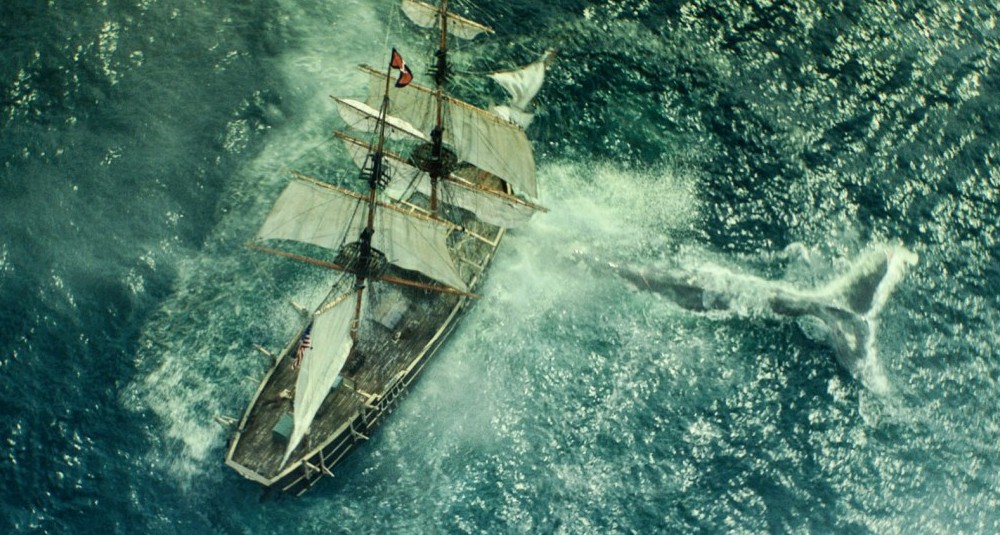Director Ron Howard’s latest dramatic feature since ‘Rush‘ is based on the similarly titled 2000 novel by Nathaniel Philbrick and once again features Chris Hemsworth as one of the protagonists, here playing Owen Chase – first mate of the Essex, a whaling ship whose fateful 1820 voyage was one of the primary sources that inspired writer Herman Melville to pen his historic fiction ‘Moby-Dick’ in 1851 (the legend of albino sperm whale Mocha Dick, who frequented the waters around the Chilean island of Mocha, was another such real-life source). Here, shots of the Essex and her crew are occasionally interjected by scenes of an eagerly attentive Melville (Ben Whishaw) listening to the recounting of the story by one of the original crew (Brendan Gleeson), often visibly pained by the memories the writer elicits from him.
The Essex hailed from Nantucket in Massachusetts, and the most obvious thing that stands out from the opening chapter of the film is the truly terrible range of accents that the cast have attempted; chief turkey among them being Hemsworth’s – to be honest, they are so bad I’m not even sure if they are attempted something similar to the modern-day region, maybe even close to Bostonian, or something which for some reason they think must have existed once upon a time. It’s all, ahem, ropey to say the least, but as a crew their collective voices seem to coalesce together and eventually it all evens out.
The crux of the story is the Essex’s basic and ongoing attempt to hunt whales, especially the extremely lucrative sperm whales, for their oil (it wasn’t until the late 1840s that Scotsman James Young really began the crude oil trade, taking out the UK and US patents for Paraffin distillation from coal in the early 1850s) and the unfortunate dearth of aquatic activity they come across leads them to desperate searches further and further into the Pacific Ocean, whereupon they encounter one particular sperm whale, bedecked white and awash with the scars of many previous encounters with man, who isn’t especially keen to let the whalers have it all their own way, and so begins their real adventure.
All of this is against the background of tension between the first mate and the captain, George Pollard (Benjamin Walker), as the latter is a posh dunderhead from a rich family, thusly gaining the position, whose manhood isn’t best pleased to find that his first mate is in fact Thor, swaggering around, vaunting up ropes, proving to always be right and seeming to single-handedly sail the ship. This element of the film never really climbs out of the doldrums of melodrama, but the recreation of the voyage amidst the setting of the ship is one of the highlights, and the story and effects, for the most part, unerringly draw us into their world for the movie’s duration, also providing the key to its eventual success as we really feel for them and the many maritime men for whom such journeys were a reality.
The additional horror of showing us the brutal reality of their line of work, with sanguinary depictions of the murder of innocent whales, will absolutely disgust many viewers, and indeed you can feel the film jitter with uncertainty over how to portray these scenes and the characters within them, but they are fascinating from a historical accuracy point of view and indeed these detailed features are in keeping with one of the many noteworthy aspects of ‘Moby-Dick’ itself, which, incredulously, was not a financial success during the author’s lifetime.

